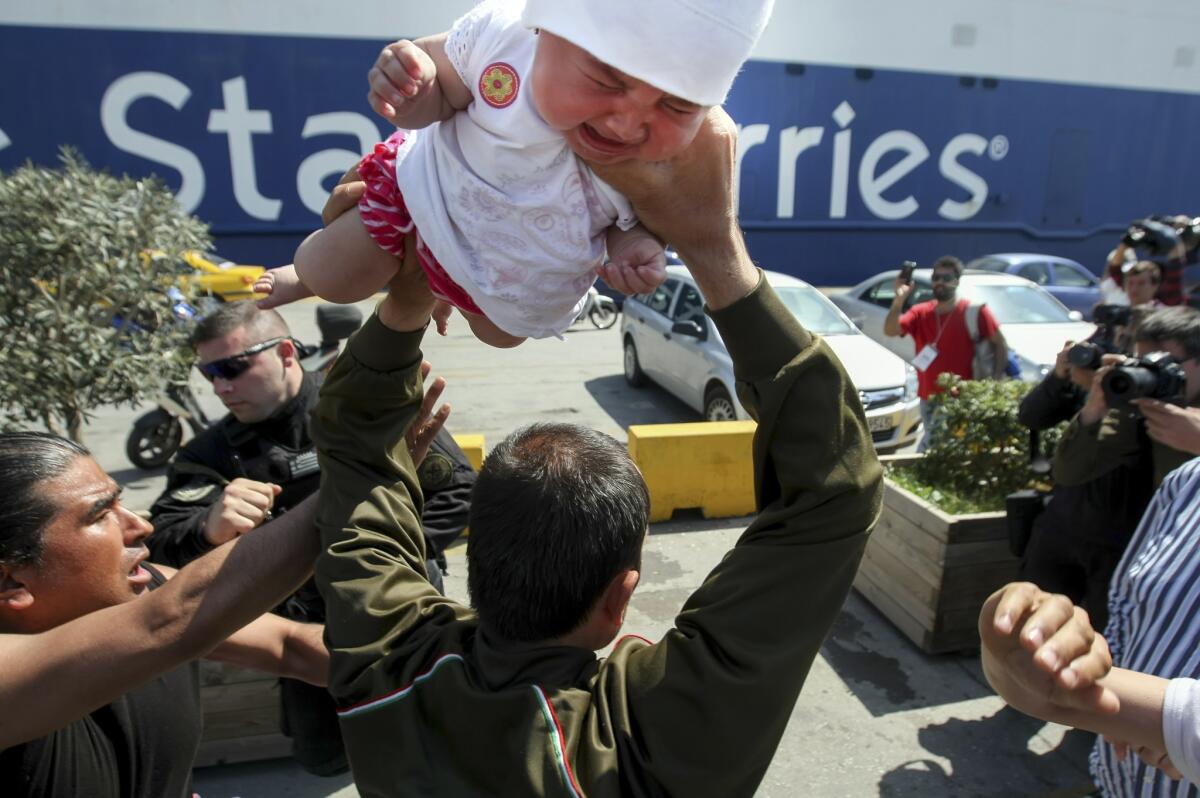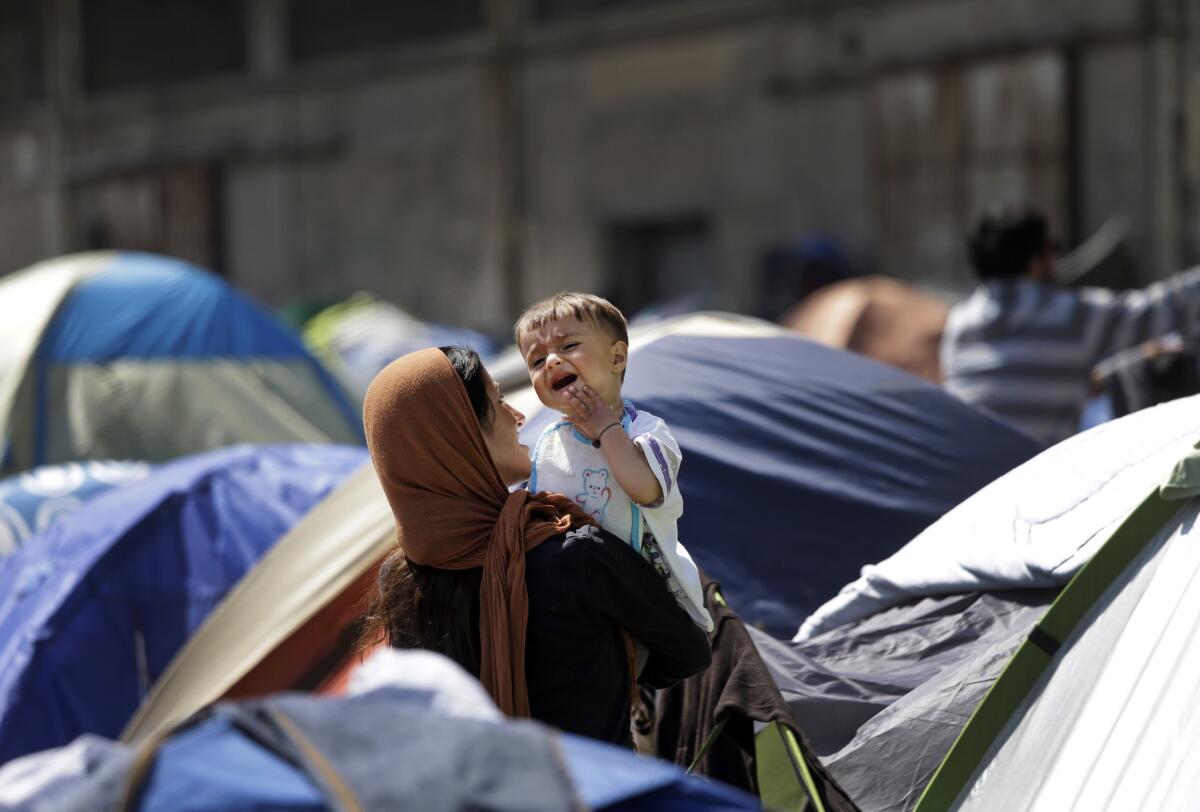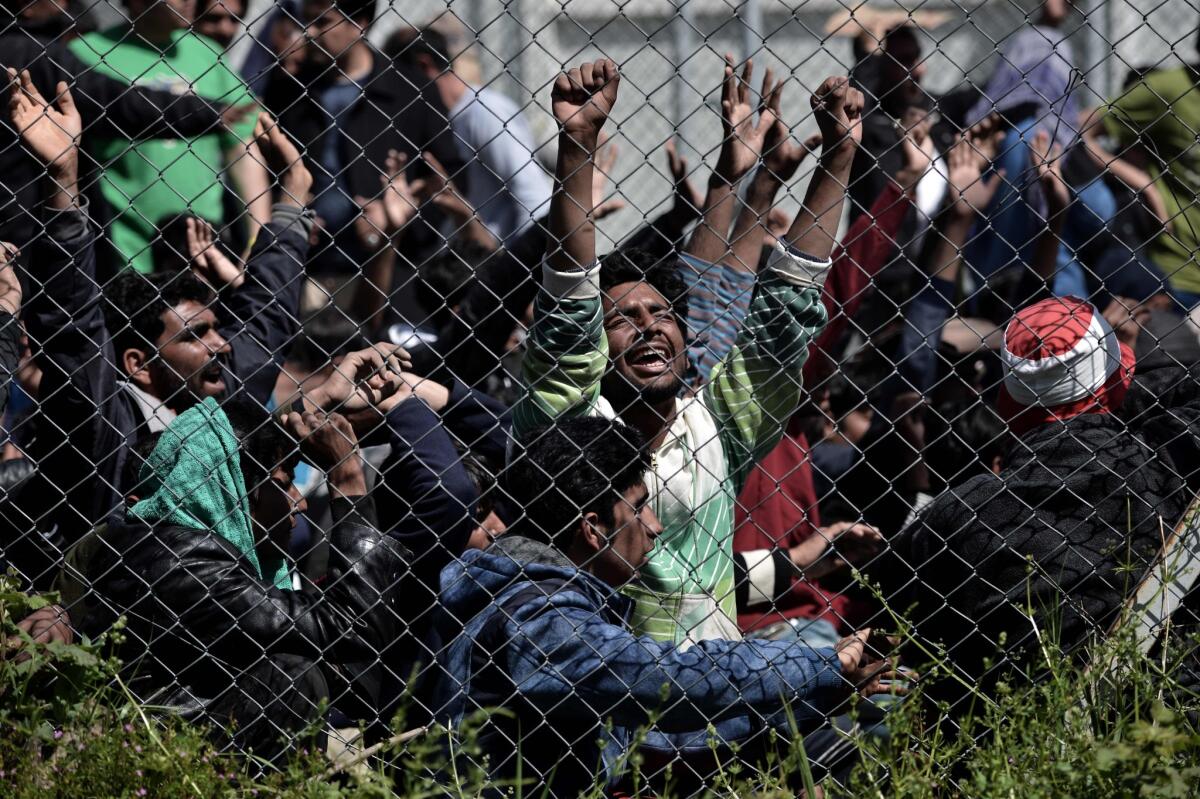Desperate acts from migrants stranded in Greek camps

- Share via
Tempers frayed among some of the 4,700 refugees and migrants camped in Greece’s biggest port on Wednesday after government officials told them they would be moved to alternative accommodation.
In one incident caught on camera, young men started sitting down in protest on the road, jostling with port officials, stopping cars from passing. As one ringleader was hustled away, another man grabbed a baby and held the child above his head as he ran into the melee.
Another man snatched the wailing infant back to safety in minutes even as the scuffles continued and the men broke away from the Greek officials to resume their protests. The situation defused shortly afterward without arrests or injuries. A Greek government statement said later that an inquiry into the incident with the baby would be launched. It wasn’t immediately clear whether the man was the infant’s father.
The incident was yet another example of the tension that marks life in limbo for the 53,000 migrants stuck in Greece. Since the northern border closed, a growing number of refugees have found themselves stranded in the makeshift camp in the Athens-area city of Piraeus, and frustration and anger are mounting.
The camp holds half the number of migrants as the tent city in Idomeni, a village in northeastern Greece where more than 11,000 people wait in vain for the Macedonian border to reopen.
Anxiety and uncertainty abound after Greece sent 202 newly arrived migrants back to Turkey on Monday as part of a controversial agreement between the European Union and Turkey that human rights groups have criticized. Under the accord, migrants and refugees who cross the Aegean Sea illegally are sent back to Turkey. Most of those sent back Monday were from Pakistan.

On Wednesday, a Pakistani man was filmed trying to hang himself from a utility pole during a demonstration against the deportations on the island of Lesbos, before another man climbed up the pole and grabbed him.
EU leaders hope the deportations will stem the wave of refugees landing on Greek shores. Already it seems that the agreement is deterring people from crossing over from Turkey. Sixty-eight migrants arrived in Greece on Tuesday, Migration Coordination Center spokesman Giorgos Kyritsis said, a dramatic decrease from daily numbers of more than 1,000 in the lead-up to the March 18 agreement. Any migrants who entered the country after March 20 are now to be held in detention centers on the islands.
Kyritsis told the Greek television network Skai that those found ineligible for asylum would be deported only after their asylum applications were duly processed. He added that the EU agreement didn’t require migrants to be deported on a daily basis.
“If there are asylum applications then they will be examined, regardless of the delays which may occur in the repatriation process,” he said.

A senior United Nations refugee official was quoted Tuesday as saying that Greek police “forgot” to process 13 of the 202 asylum seekers sent to Turkey on Monday.
Vincent Cochetel, Europe bureau director for the Office of the United Nations High Commissioner for Refugees, told the Guardian newspaper that 13 Afghans and Congolese asylum seekers who reached the Greek island of Chios after March 20 and were deported to Turkey on Monday had not been allowed to formally register their asylum claims because of administrative chaos on the island. Refugee agency spokesmen couldn’t be reached for comment.
Greek officials want Piraeus Port cleared of the refugees stranded there. Poor organization and scarce resources at the camp, combined with a lack of information about the new deal with Turkey, has created a heightened atmosphere of fear, according to a March 24 Human Rights Watch report.
But the people in the camp are also anxious about being moved elsewhere, fearing that it’s just a ruse to send them back to Turkey. They have also heard from friends and relatives that conditions are worse at other sites, which are usually isolated or in the countryside, away from urban centers.
Authorities plan to gradually move the population of the Piraeus camp to a new center by April 12, Kyritsis said. The goal is to completely empty the port before the Greek Easter holiday at the end of April, when many Greeks visit family on the islands.
The same time frame was being considered for dismantling the camp at Idomeni, he said. Sporadic protests there, too, including blocking trucks from using national roadways, have led to tensions between residents and the refugees.
Petrakis is a special correspondent.
ALSO
The migrant trail to Europe is about to start running in reverse
Migrants are removed from Greece and shipped to Turkey under plan to ease crisis
'My God. We've done this': Meet the reporters who probed the Panama Papers
Sign up for Essential California
The most important California stories and recommendations in your inbox every morning.
You may occasionally receive promotional content from the Los Angeles Times.






